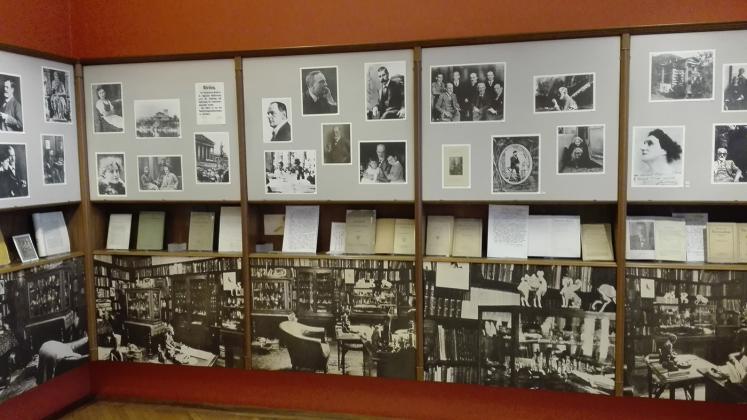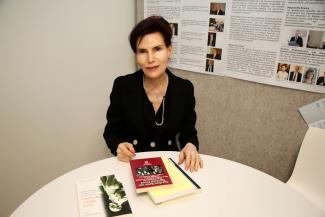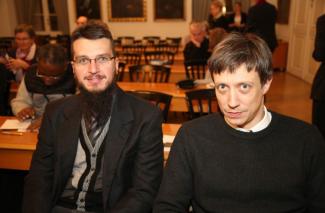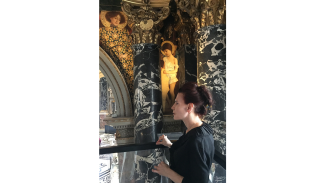
Research
The methodology of the ongoing and planned research projects of the Department of Psychodynamics under the professorship of Univ.-Prof. Dr. habil. Patrizia Giampieri-Deutsch includes metacognitive and epistemological approaches in addition to state of the art psychotherapy research.
In addition to the clinical and empirical investigation of processes and outcomes of psychotherapeutic treatments, this also allows for the exploration of meta-theoretical issues and, in particular, the investigation of phenomena in the field of subjectivity in a non-reductive manner using first-person methodologies. Further empirical methodologies are also used for psychotherapy research as well as for average population research projects. Psychometric instruments developed on the basis of clinical experience in psychoanalysis and psychodynamic psychotherapy are used. Experimental methodologies are integrated into psychodynamic psychotherapy research to better understand the nature of the psychophysical continuum and how therapeutic change is effected by examining the impact of psychodynamic treatments on neurobiological functioning.
In particular, the Division of Psychodynamics also explores the applications of research methodologies to non-clinical phenomena and branches of knowledge. A wide range of projects are carried out, resulting in a continuous peer-reviewed publication activity with leading international journals and publishing houses.
Currently, the work of Professor and Head Patrizia Giampieri-Deutsch (2020) Freud's Dynamic Structural Model of the Mental in the 21st Century should be mentioned. The work was published in the series Sigmund Freud's Works. Viennese Interdisciplinary Commentaries, with Patrizia Giampieri-Deutsch as co-editor. In it, two of Freud's central texts are newly annotated in light of the current state of interdisciplinary scientific research and provided with a systematic introduction that presents Freud's theory of the mind from the point of view of contemporary psychoanalytic research and brings it into interdisciplinary dialogue with advanced approaches to cognitive research, cognitive neuroscience, and philosophy of mind.
Current research projects further include the cross-disciplinary study of subjective experience, such as the project Psychodynamic and Scientific Historical Aspects of Empathy [CICLO XXXI SSD M-FIL/03] in cooperation with the Italian University Federico II Naples, or the project The Irreducibility of Experience [SC16-025] funded by the Lower Austrian Science and Education Fund (NFB). The latter examines selected designs and currents as well as controversies dealing with the phenomenon of subjective experience in psychodynamic psychotherapies. Psychoanalytic research findings as well as converging theories from phenomenological and neurocognitive embodiment research, Philosophy of Mind, and findings from the cognitive field are systematically brought into conversation with each other in order to locate areas of convergence. In particular, the Division of Psychodynamics also explores the applications of research methodologies of the these disciplines to non-clinical phenomena and branches of knowledge.
The psychological and psychodynamic studies of religious experience represent a science of human behavior and experience, so that religious experience as a specifically human experience can be addressed by methodologies of psychodynamic psychotherapy research (first-person methodologies).
Maimonides Lectures
A major pivot of the professorship's research is the project Psychological and Psychodynamic Aspects of Religious Experience in the Frame of Reference of the Abrahamic Religions [K3F730/001-2017 and K3F730/006-2022], sponsored by the Office of the Government of Lower Austria. The research-generated Maimonides Lectures, which address the interactions between the Abrahamic religions and sciences, especially the health sciences, under the auspices of the Office of the Provincial Government of Lower Austria, emerge from this project. Symposia and Keynote Lectures in Vienna at the Austrian Academy of Sciences and at the KL in Krems will enable a continuous encounter between the religious communities, researchers as well as students.
The Maimonides Lectures in Lower Austria are jointly organized by the Austrian Academy of Sciences (ÖAW) with the Abrahamic religious communities in Austria and the Karl Landsteiner University for Health Sciences (KL) under the auspices of the Office of the Lower Austrian Government and establish cooperative, sustainable research at the level of excellence. This is not least intended to contribute to basic research in the Medical Humanities. The following Abrahamic religious communities participate in the Maimonides Lectures: Old Catholic Church, Bulgarian Orthodox Church, Evangelical Church A. and H. B., United Methodist Church of Vienna, Greek Orthodox Church, Islamic religious community in Austria, Jewish Community of Vienna, Coptic Orthodox Church, Roman Catholic Church, Romanian Orthodox Church, Serbian Orthodox Church and Syrian Orthodox Church. Further companions are the University College of Christian Churches for Teacher Education Vienna/Krems and the Coordination Committee for Christian-Jewish Cooperation.
- In the period before the cooperation with the Government of Lower Austria and the Karl Landsteiner Private University for Health Sciences, the following events were held:
- 1st Maimonides Lectures: Humanities – Traditional Heritage and Current Challenges, (February 19th – 20th, 2014); Keynote: Univ.-Prof. Dr. Vittorio Hösle
- 2nd Maimonides Lectures: Justice: Religion and Education (November 26th – 27th, 2014) Keynote: Univ.-Prof.in Dr.in Inci Dirim
- 3rd Maimonides Lectures: Humanities and Revelation (February 25th – 26th 2015) Keynote: w.M. em. o. Univ.-Prof. Hans-Dieter Klein
- 4th Maimonides Lectures: Mental Health: A Dialogue Between Clinical Sciences and Faith (November 4th – 5th 2015); Keynote: Em. Univ.-Prof. Dr. Shmuel Erlich
- 5th Maimonides Lectures: Trauma and Memory (March 1st – 2nd 2017); Keynote: past EPF-President Univ.-Prof. Dr. Jorge Canestri
- Since the beginning of the project K3-F-730/001-2017 of the Government of Lower Austria and the cooperation with Karl Landsteiner Private University for Health Sciences, the following events have been held:
- 6th Maimonides Lectures: Reconciliation: Remission of Guilt through Reparation? (November 29th – 30th 2017); Keynote: Univ.-Prof. i. R. Dr. Karl Brunner
- 7th Maimonides Lectures: The Embodiment of the Mind: The Resurrection of the Body (June 27th - 28th 2018) Keynote: Univ.-Prof.in Dr.in h.c. Hanna-Barbara Gerl-Falkovitz
- 8th Maimonides Lectures: The Road into the Open. Emancipatory Narratives of the Exodus from Egypt in the Abrahamic Tradition (November 28th – 29th 2018); Keynote: w.M. Univ.-Prof. Dr. Manfred Bietak
- 9th Maimonides Lectures: Monotheism, Atheism, and “Two Thrones” in Heaven (June 26th – 27th 2019) Keynote: w.M. em. o. Univ.-Prof. Hans-Dieter Klein
- 10th Maimonides Lectures: Mind. Health, Illness, and Recovery in the Abrahamic Tradition (November 27th – 28th 2019); Keynote: Univ.-Prof. Mag. Dr. Rüdiger Lohlker
- 11th Maimonides Lectures: The Origins of Evil. Thoughts and Approaches (September 16th – 17th 2020) Keynote: Univ.-Prof. Dr. Gerhard Langer
- 12th Maimonides Lectures: Hope in the Abrahamic Reigions (February 10th – 11th 2021); Keynote: Bishop em. Hon.-Prof. Dr. Michael Bünker
- 13th Maimonides Lectures: Gratitude (November 3rd – 4th 2021); Keynote: Univ.-Prof. PD Dr. Philipp Scheibelreiter
- 14th Maimonides Lectures: Faith, Science, Superstition: Health and Mental Health and the Abrahamitic Religions (May 4th – 5th 2022); Keynote: w.M. em. o. Univ.-Prof. Dr. Helmut Denk
- 15th Maimonides Lectures: The Practice of Confessional Faith and it’s Limitations (November 23rd – 24th 2022); Keynote: Christo Buschek
- 16th Maimonides Lectures: Psychodynamic psychotherapies and pastoral care (May 31st – June 1st 2023); Keynote: Rektor MMag. Dr. Hubert Philipp Weber
- 17th Maimonides Lectures: Empathy. A multidisciplinary perspective (November 8th – 9th 2023) ; Keynote: Assoz.-Prof. Dr. Christophe Erismann
Medical Humanities
The Medical Humanities open up a field in which medicine and human sciences enter into a dialogue about subjective experiences and conceptual questions. In addition, the Medical Humanities open the opportunity to reflect on one's own functioning, on the intended goals of personal and professional identity formation, and on how to improve the education of students. Medical Humanities raises a wide range of questions about professional ethics and treatment techniques, the management and limits of treatment, and subjective understandings of illness and death, including their religious aspects. Accordingly, this field of research implies a strong focus on the mental processes of patients and those treating them from perspectives that transcend both the medical and psychological viewpoints.
Univ.-Prof.in Dr.in Patrizia Giampieri-Deutsch bei den 10. Maimonides Lectures "Psyche. Gesundheit, Erkrankung und Heilung im Bezugsrahmen der Abrahamitischen Religionen" von 27.-28.11.2019 an der KL
Chris Deutsch
Univ.-Prof.in Dr.in Patrizia Giampieri-Deutsch bei der Antrittsvorlesung "Psychodynamische Psychotherapieforschung: Eine Bestandsaufnahme regionaler und internationaler Perspektiven mit Ausblick" am 30.10.2018 an der KL
Franz Morgenbesser
DDr. Ivan Rotella (links) und Dr. Robert Stefan, BA, MA, MSc (rechts) bei den 6. Maimonides Lectures „Versöhnung: Aufhebung der Schuld durch Wiedergutmachung?“ von 29.-30.11.2017 an der Österreichischen Akademie der Wissenschaften (ÖAW)
Franz Morgenbesser
Stairway to Klimts Dante“ Univ.-Prof.in Dr.in Patrizia Giampieri-Deutsch zwischen Gustav Klimts dunklem Konterfei von Dante Alighieri und Beatrice mit weißer Lilie (Fresco, Stiegenaufgang, Kunsthistorisches Museum Wien)
Johannes DeutschHeader:
Ausstellung im Sigmund Freud Museum.jpg
Exhibition in the Sigmund Freud Museum (Berggasse 19, Vienna, Austria)
Siesta
Creative Commons Attribution-Share Alike 4.0
Ausstellung im Sigmund Freud Museum.jpg Copy
The image is displayed/cropped in a different format depending on the end device.

